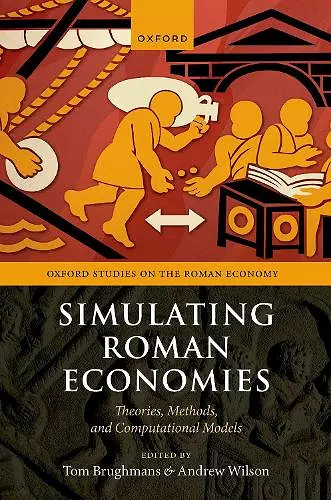Simulating Roman Economies
Theories, Methods, and Computational Models
Andrew Wilson editor Tom Brughmans editor
Format:Hardback
Publisher:Oxford University Press
Published:14th Sep '22
Should be back in stock very soon

The use of formal modelling and computational simulation in studies of the Roman economy has become more common over the last decade. But detailed critical evaluations of this innovative approach are still missing and much needed. What kinds of insights about the Roman economy can it lead to that could not have been obtained through more established approaches, and how do simulation methods constructively enhance research processes in Roman Studies? This edited volume addresses this need through critical discussion and convincing examples. It presents the Roman economy as a highly complex system, traditionally studied through critical examinations of material and textual sources, and understood through a wealth of diverging theories. A key contribution of simulation lies in its ability to formally represent diverse theories of Roman economic phenomena, and test them against empirical evidence. Critical simulation studies rely on collaboration across Roman data, theory, and method specialisms, and can constructively enhance multivocality of theoretical debates of the Roman economy. This potential is illustrated, avoiding computational and mathematical language, through simulation studies of a wealth of Roman economic phenomena: from maritime trade and terrestrial transport infrastructures, through the economic impacts of the Antonine Plague and demography, to local cult economies and grain trade. Through these examples and discussions, this volume aims to provide the common ground, guidance, and inspiration needed to make simulation methods part of the tools of the trade in Roman Studies, and to allow them to make constructive contributions to our understanding of the Roman economy.
This is the eighteenth volume in the series "Oxford Studies on the Roman Economy" that Alan Bowman and Andrew Wilson launched in 2009, and arguably the most innovative to date. It sends a strong message that computational modeling has now sufficiently matured to make a substantial contribution to our understanding of Roman economic history, and even more importantly to our understanding of how to study that history. * Walter Scheidel, Stanford University *
The present volume serves as a guide for those scholars (present and future) who aim to reunite the field. * Bart Danon, Groningen University, JRS *
It should be emphasised that the volume is a valuable entry in the debate on Roman economic performance. It offers ample ground and inspiration for future research in Roman economic history and ancient history in general, demonstrating the potential of computer models and simulations in constructively enhancing research processes and providing new insights that cannot be obtained by traditional approaches. * Paulina Komar, Classical Review *
Simulating Roman Economie, co-edited by Tom Brughmans and Andrew Wilson, illustrates much that makes the series distinctive. It represents a careful but insistent call to arms. * James Corke - Webster, Greece & Rome *
Simulating Roman Economies, co-edited by Tom Brughmans and Andrew Wilson (the latter the indefatigable engine behind the Oxford Roman Economy Project and this series, its published legacy), illustrates much that makes the series distinctive. It represents a careful but insistent call to arms. * James Corke-Webster, Kings College London, UK *
ISBN: 9780192857828
Dimensions: 240mm x 160mm x 21mm
Weight: 740g
356 pages